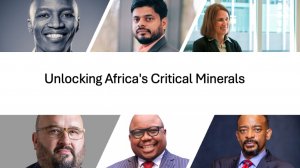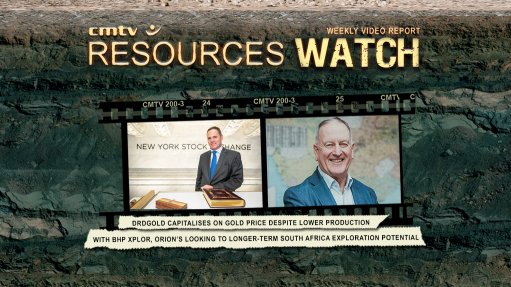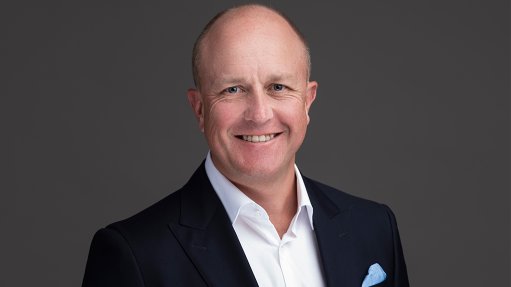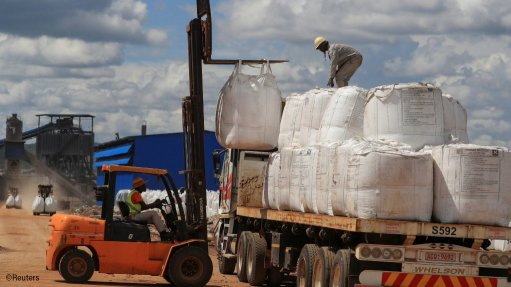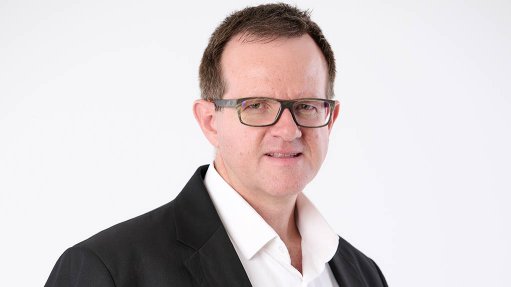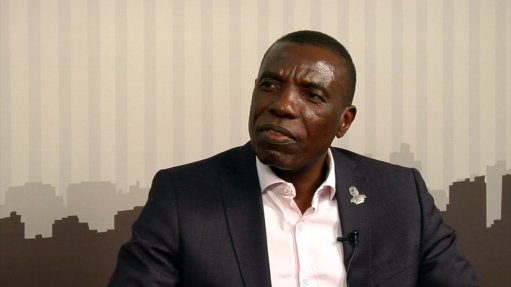Exploration, partnerships the cornerstones of increasing critical minerals investment

Facilitator Laura Nicholson from Investing in African Mining Indaba speaks to a panel of experts about unlocking Africa’s critical minerals through global demand and local development.
As the world demands more “new” minerals such as copper, lithium and rare earths for use in smart technologies for decarbonisation and clean energy production, African countries have some key considerations to take into account to garner investment in its rich endowment of these minerals.
In a panel hosted by Creamer Media on November 20, experts in the critical mineral sector and technology sphere discussed the importance of exploration and defining what critical minerals mean for the African continent.
Council for Geoscience CEO Mosa Mabuza said a critical minerals strategy must start with understanding each country’s mineral resources, how much more is left to uncover and what the country’s agenda with these minerals can be in the global supply chain.
The challenge, however, is underspending on exploration, with developed economies spending an average $65/m2 on geoscience and African countries only spending $5 /m2, yet Africa has always been a supplier of choice for minerals.
He suggested a deliberate continentwide approach to put together surveys of all African nations to find opportunities for collaboration and investing in more critical minerals discovery in an informed manner.
“A truly integrated value chain proposition can benefit the African continent and those that consume the minerals,” he said.
South Africa, for one, as a mature mining country has ample lessons to share that other countries can apply to their own mining sectors. “Our forebearers did a fantastic job of delineating mineral systems, particularly the Witwatersrand gold complex, the Bushveld Igneous Complex and the manganese fields in the Northern Cape.
“They consistently invested in geology to a certain point. There must be continuous research which will allow for some level of serendipitous discovery to happen,” Mabuza said, adding that South Africa has a solid foundation on which it is able to extrapolate when it moves into this new range of minerals that is creating a lot of enthusiasm.
He continued that key considerations for African countries now are what minerals the world will demand to reach net zero by 2050, what they have to offer and what policy will be best suited in this regard.
Zambia, for example, recently undertook a national air coverage geophysics survey totalling more than $100-million to acquire data. “Once you have taken a decision like that as a country, the rest can follow,” Mabuza said.
Industrial Development Corporation (IDC) senior industry specialist Kgashane Mohale advocated for more developmental institutions to consider financing for junior miners to conduct exploration, as the IDC itself is advancing an exploration fund together with government.
The corporation is finalising a first round of R160-million of grant funding to junior mining companies, as part of a R400-million total allocation, which the corporation will recover if projects are successful on a case-by-case basis through future ownership agreements.
For more these kinds of investments to release, Hyve Group’s Investing in African Mining Indaba content and strategic partnerships head Laura Nicholson said, naturally, countries’ regulations have a huge role to play in how critical minerals are developed.
Minerals Council South Africa CEO Mzila Mthenjane agreed, adding that more African countries need to start positioning the mining industry as a key catalyst for economic development, with the following decisions needing to be made in support of that view.
“From exploration to mining, it should be made as easy as possible. Policies from ease of access to information to quicker approvals, including for supportive licences such as water use, is important.
“Exploration is still a high risk initial step for companies, so that needs to be as painless as possible in terms of policymakers’ response. There should also not be too much of a burden in terms of what is expected in terms of social responsibility at this level. More mature mining companies are able to meet more stringent regulatory requirements,” Mthenjane stated.
He added that exploration licences should ideally not take more than three months to obtain.
Church of England Pensions Board chief responsible investment officer Adam Matthews said investors have ever-increasing expectations on environment, social and governance (ESG) best practice, which can help guide the way in which mineral-countries seek financing, particularly as about 300 new mines will be required to meet the goals of the global energy transition.
He emphasised the importance of partnerships and coordination to unlock the minerals that are needed for global developments, including unlocking investment in exploration and regulatory stability where operations take place. Matthews also motivated for partnerships to better share risk in big investments.
MTN Business information and communication technology solutions GM Sudipto Moitra stressed the important role of technology in realising more critical mineral mining projects and realising ESG benefits.
“There are profound business areas from planning to safety where technology is playing a critical role. Across the 17 markets that MTN operates in, miners are constantly looking at bringing in more modern technology, with connectivity being the bedrock of all technology.”
Mohale concluded that partnerships go a long way to help investors understand the local landscape and navigate the risks involved with investing in each jurisdiction.
Article Enquiry
Email Article
Save Article
Feedback
To advertise email advertising@creamermedia.co.za or click here
Press Office
Announcements
What's On
Subscribe to improve your user experience...
Option 1 (equivalent of R125 a month):
Receive a weekly copy of Creamer Media's Engineering News & Mining Weekly magazine
(print copy for those in South Africa and e-magazine for those outside of South Africa)
Receive daily email newsletters
Access to full search results
Access archive of magazine back copies
Access to Projects in Progress
Access to ONE Research Report of your choice in PDF format
Option 2 (equivalent of R375 a month):
All benefits from Option 1
PLUS
Access to Creamer Media's Research Channel Africa for ALL Research Reports, in PDF format, on various industrial and mining sectors
including Electricity; Water; Energy Transition; Hydrogen; Roads, Rail and Ports; Coal; Gold; Platinum; Battery Metals; etc.
Already a subscriber?
Forgotten your password?
Receive weekly copy of Creamer Media's Engineering News & Mining Weekly magazine (print copy for those in South Africa and e-magazine for those outside of South Africa)
➕
Recieve daily email newsletters
➕
Access to full search results
➕
Access archive of magazine back copies
➕
Access to Projects in Progress
➕
Access to ONE Research Report of your choice in PDF format
RESEARCH CHANNEL AFRICA
R4500 (equivalent of R375 a month)
SUBSCRIBEAll benefits from Option 1
➕
Access to Creamer Media's Research Channel Africa for ALL Research Reports on various industrial and mining sectors, in PDF format, including on:
Electricity
➕
Water
➕
Energy Transition
➕
Hydrogen
➕
Roads, Rail and Ports
➕
Coal
➕
Gold
➕
Platinum
➕
Battery Metals
➕
etc.
Receive all benefits from Option 1 or Option 2 delivered to numerous people at your company
➕
Multiple User names and Passwords for simultaneous log-ins
➕
Intranet integration access to all in your organisation


